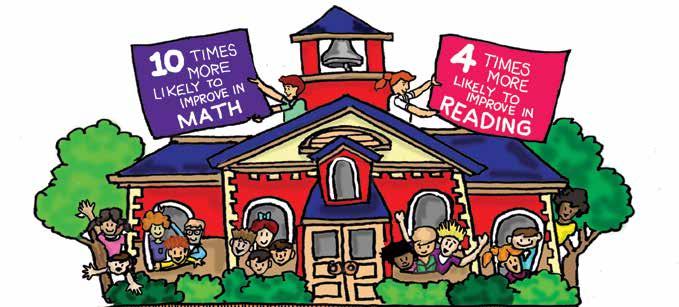
4 minute read
Conclusion & Recommendations
from Ready or Not: How California School Districts are Reimagining Parent Engagement in the Era of LCFF
Reviewing the candid words of school district leaders across California, it is clear that we are at an exciting, if daunting, moment in educational history. In this new era of LCFF, we have the opportunity to shed our complacency and to abandon practices that have become stale and fruitless. We can finally reimagine parent engagement. But are we ready or not? Although this report highlights signs of progress underway throughout the state, let us be clear: they are still the exception, not the rule. Overall, most districts continue to neglect their parent engagement duties, or flounder in executing them. However, let us also emphasize that district leaders genuinely want to succeed at parent engagement; they just lack the tools and expertise needed to do it right. And in too many cases, they still fail to see the connection between effective parent engagement and improved student learning, despite ample evidence proving otherwise. The good news is that most districts are ready to reimagine parent engagement, as long as they have a roadmap to help them chart their new course. The parent engagement component of the evaluation rubrics is meant to help administrators determine what effective parent engagement looks like and how to measure it. California is arguably more committed than ever to delivering an excellent and equitable education to all of its students. One administrator told us, “in my entire career, I have never seen district administrators so involved at this level.” This is the promise of LCFF. However, that promise will not be fulfilled unless we can finally succeed at engaging parents and families where they are. The journey from routine compliance to authentic engagement is long, but our students are counting on us to get there as quickly as possible.

Advertisement
The following are the Families In Schools recommendations for districts and state officials seeking to practice and systematize meaningful parent engagement:
1 2 3
DEVELOP STATEWIDE STANDARDS FOR PARENT ENGAGEMENT
Now that parent involvement (i.e. parent engagement) is one of California’s eight education priorities under LCFF, the evaluation rubrics should include statewide and local standards to determine how effectively schools and districts are engaging parents. Defining consistent, high quality standards will help educators and administrators measure their success. Best practices and current research should be referenced when designing the standards. Families In Schools recommends reviewing the following key documents: • California Department of
Education’s “Family Engagement
Framework: A Tool for California
School Districts”
• The U.S. Department of
Education’s “Dual Capacity
Framework for Family-School
Partnerships”2 • Families In Schools Rubrics for
Parent Engagement Research-
Based Measures
BUILD RELATIONSHIPS AND PARTNERSHIPS BETWEEN PARENTS AND SCHOOL STAFF
There is a correlation between the involvement of parents and their positive relationships with the school and staff. Nurturing these relationships through active listening and team-building will foster successful partnerships. • Rather than training teachers and parents separately in parent engagement activities, train them together in the same series of workshops in order to develop shared understanding, trust, and empowerment, enabling them to work together as partners. • Create teams of parents and educators that examine key issues at schools.
• Give teachers and parents the tools and data and the understanding of how to collaboratively use these tools and data to build their LCAP programs and evaluate trends.
INVEST FUNDING AND RESOURCES IN PARENT ENGAGEMENT TO MEET LCAP GOALS
Parent engagement should be prioritized as an effective strategy to meet LCAP goals, but success requires an investment of resources and programs. Funding parent engagement appropriately will yield positive outcomes in other areas, most importantly in student achievement.
• The LCAP should provide concrete budgetary allotment dedicated to parent engagement activities that are linked to metrics and outcomes.
• Investment should include the human capital needed to perform effective outreach to hard-to-reach communities, which may include new district and/or school site positions and resources to meet parent engagement goals. • Ensure that specialized needs such as bilingual staff and translation services are taken into consideration in financial allotments.
2. 2013. USDOE Dual Capacity Framework for FamilySchool Partnerships. http://www2.ed.gov/documents/ family-community/partners-education.pdf
4 5 6
PARTNER WITH COMMUNITY GROUPS AND OTHER EXTERNAL ORGANIZATIONS
Districts and schools cannot, and should not, be expected to engage entire communities on their own. By partnering with community groups and others, districts and schools can leverage pre-existing relationships with parents that these organizations already possess. • Forming partnerships with community-based organizations, advocacy groups, universities, and other external organizations can help reach disenfranchised communities.
• Forming partnerships can also leverage training resources and programs to build capacity of teachers and staff.
• External partners can also help districts translate and adopt parent feedback into policy and budget decisions.
TAILOR PROGRAMS TO THE DIFFERENT NEEDS OF PARENTS
Schools can provide varying levels of support to parents based on their needs and roles. For example, training for parent leaders in advisory committees looks significantly different from the kinds of supports parents need to enhance their children’s literacy in elementary school. • Ensure that programs exist to serve both “parents” and
“parent leaders.” • Rather than adopting generic programs, tailor parent engagement to the unique language and cultural realities of communities in each district.
PROVIDE PROFESSIONAL DEVELOPMENT ON PARENT ENGAGEMENT
Districts and schools must train teachers, school staff and administrators to understand and practice quality parent engagement, recognizing that it requires a series of skills that can be improved with practice and strong coaching. • Build a professional culture that highly values and rewards effective parent engagement. • Identify experts in parent engagement and position them as mentors to other educators.
• Embed parent engagement as part of the annual professional development plan.






